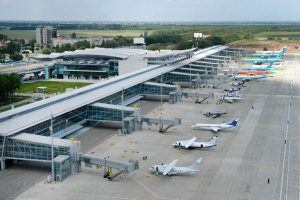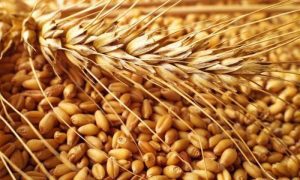
Ukrainian enterprises reduced the import of copper and copper products in value terms by 9% to $93.276 million in January-October this year compared to the same period last year.
According to customs statistics published by the State Customs Service of Ukraine, export of copper and copper products decreased 7.6% to $63.017 million in the first 10 months of 2020.
In October, copper and copper products were imported in the tune of $11.915 million, and exported in the tune of $7.934 million.

Passenger traffic at Boryspil International Airport decreased by 65% in January-October 2020 and amounted to 4.53 million people.
As the airport said on its Facebook page on Monday, the number of transfer passengers decreased by 84.9% to 435,500, the number of flights by 57.9% to 39,800.
In October 2020, the airport served 472,500 passengers (less by 67.3%), of which 17,400 (84.9% less) were transfer.
The number of flights was more than 4,300 (56.9% less) in the past month.
As reported, Boryspil International Airport in 2019 increased passenger traffic by 21.1% to 15.260 million people compared to 2018.
Boryspil International Airport is the largest airport in Ukraine with a total occupied area of about 1,000 ha. It has two runways: the one is 4,000 meters long and 60 meters wide, the second is 3,500 meters long and 63 meters wide. There are four passenger terminals and a postal and cargo complex on its territory.
BORYSPIL AIRPORT, BORYSPIL INTERNATIONAL AIRPORT, PASSENGER, PASSENGER TRAFFIC

The annual general meeting of shareholders of Kernel, one of the largest Ukrainian agrarian groups, at a meeting on December 10, plans to approve the payment of dividends for the 2020 financial year (FY, July-2019 – June-2020) in the amount of $0.42 per share.
This is stated in the draft decisions of the general meeting at the Warsaw Stock Exchange on Monday.
In addition, the shareholders plan to agree at the meeting to reappoint the Luxembourg Deloitte Audit as an independent auditor of Kernel.

In October 2020, mobile operators connected 2,497 settlements to 4G communication, providing 320,000 Ukrainians with high-speed mobile Internet, the Ministry of Digital Transformation said on its Facebook page on Monday.
“With the support of the Ministry of Digital Development, mobile operators provide access to 4G for residents of rural areas and remote regions of the country. Over the past month, almost 2,500 settlements have been connected to 4G, and more than 300,000 Ukrainians have been able to use high-speed Internet in their cell phone for the first time,” the press service of the ministry quoted Deputy Prime Minister, Minister of Digital Transformation Mykhailo Fedorov as saying.
According to the minister, the project of providing high-speed Internet to Ukrainians is a priority for the state. “Thanks to the launch of the provision of 4G mobile services in the 900 MHz range, we have doubled the coverage of high-speed mobile Internet,” he clarifies.
According to the ministry, over the entire period of the project, from July to October 2020, more than 4.7 million Ukrainians received 4G (7,700 settlements). At the same time, more than 1.5 million Ukrainians received 4G for the first time (3,800 settlements). In general, 20,506 cities and villages have 4G in the country.
“It remains to connect another 7,300 settlements. These are small villages, where residents often do not have any access to high-speed Internet. By the end of the year, 4G will become available to residents of Cherkasy, Dnipropetrovsk, Kherson, Kharkiv, Zaporizhia, Donetsk, Luhansk regions,” the ministry said.

The mobile communications operator lifecell increased operating income by 14.2% to UAH 1.746 billion in July-September 2020 (compared to UAH 1.529 billion in July-September 2019).
According to the operator’s press service, the net profit amounted to UAH 36.8 million for the specified period (in the third quarter of 2019, the net loss was UAH 338.3 million). EBITDA increased by 12.3% to UAH 909.8 million, EBITDA margin was 52.1% (for the same period in 2019, this indicator was 53%).
The operator lifecell’s active three-month subscriber base increased by 13% to 7.8 million subscribers in the third quarter and by 2.6% compared to the previous quarter.
At the same time, the active three-month base of users of high-speed mobile 4.5G Internet grew by 51% by the end of the third quarter of 2020 compared to last year and accounted for 60% of all users of data services. Accordingly, the average use of data traffic grew by 59% year to year.
The company’s active three-month ARPU increased by 2.1% in the third quarter of 2020 and amounted to UAH 76.3 compared to UAH 74.7 in the previous year. At the same time, the 12-month active MoU grew by 20.5% to 180.8 minutes (150.1 minutes in Q3 2019).
The operator lifecell’s capital investments increased by 57.1% to UAH 860.6 million in the third quarter of 2020 versus UAH 547.7 million in the third quarter of 2019.
“This quarter we achieved net income for the first time since the company had started operating in 2005. Our subscriber base is continuing to grow, smartphone penetration has reached 81%. The company has managed to gain such results despite all challenging circumstances like pandemic environment, uncompetitive market conditions and strong commitments to state related to fast 4G rollout. And I would like to assure you that we will continue to invest in Ukraine and to do everything we can to provide all our subscribers with best products and services,” Chief Executive Officer of lifecell Ismet Yazici said.

Ukraine since the beginning of the new 2020/2021 agricultural year (July-June) and as of November 9, exported 17.35 million tonnes of cereals and legumes, which is 3.59 million tonnes less than on the same date of the previous agri-year.
According to the information and analytical portal of the agro-industrial complex of Ukraine, to date, 10.97 million tonnes of wheat (1.24 million tonnes down), 3.38 million tonnes of barley and 2.93 million tonnes of corn (2.2 million tonnes down) were exported.
As of November 9 this year, 62,600 tonnes of flour were also exported.